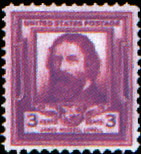James Russell Lowell
 James Russell Lowell, who became professor of modern languages at
Harvard after Longfellow retired, is the Matthew Arnold of
American literature. He began as a poet but gradually lost his
poetic ability, ending as a respected critic and educator. As
editor of the Atlantic and co-editor of the North
American
Review, Lowell exercised enormous influence. Lowell's A
Fable for
Critics (1848) is a funny and apt appraisal of American
writers,
as in his comment: "There comes Poe, with his raven, like Barnaby
Rudge / Three-fifths of him genius and two-fifths sheer fudge."
James Russell Lowell, who became professor of modern languages at
Harvard after Longfellow retired, is the Matthew Arnold of
American literature. He began as a poet but gradually lost his
poetic ability, ending as a respected critic and educator. As
editor of the Atlantic and co-editor of the North
American
Review, Lowell exercised enormous influence. Lowell's A
Fable for
Critics (1848) is a funny and apt appraisal of American
writers,
as in his comment: "There comes Poe, with his raven, like Barnaby
Rudge / Three-fifths of him genius and two-fifths sheer fudge."
Under his wife's influence, Lowell became a liberal reformer, abolitionist, and supporter of women's suffrage and laws ending child labor. His Biglow Papers, First Series (1847- 48) creates Hosea Biglow, a shrewd but uneducated village poet who argues for reform in dialect poetry. Benjamin Franklin and Phillip Freneau had used intelligent villagers as mouthpieces for social commentary. Lowell writes in the same vein, linking the colonial "character" tradition with the new realism and regionalism based on dialect that flowered in the 1850s and came to fruition in Mark Twain.
